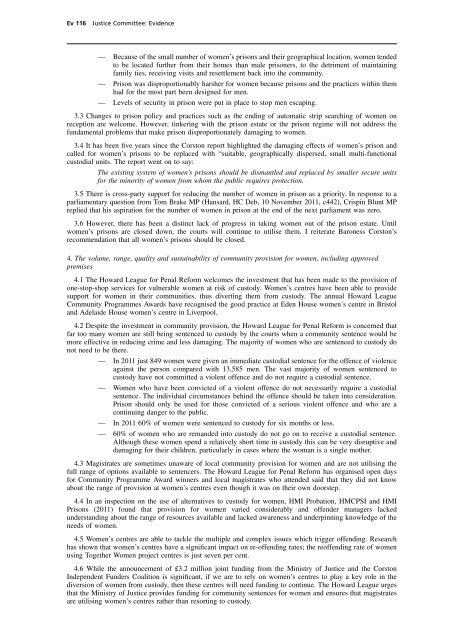Women offenders: after the Corston Report - United Kingdom ...
Women offenders: after the Corston Report - United Kingdom ...
Women offenders: after the Corston Report - United Kingdom ...
Create successful ePaper yourself
Turn your PDF publications into a flip-book with our unique Google optimized e-Paper software.
Ev 116Justice Committee: Evidence— Because of <strong>the</strong> small number of women’s prisons and <strong>the</strong>ir geographical location, women tendedto be located fur<strong>the</strong>r from <strong>the</strong>ir homes than male prisoners, to <strong>the</strong> detriment of maintainingfamily ties, receiving visits and resettlement back into <strong>the</strong> community.— Prison was disproportionably harsher for women because prisons and <strong>the</strong> practices within <strong>the</strong>mhad for <strong>the</strong> most part been designed for men.— Levels of security in prison were put in place to stop men escaping.3.3 Changes to prison policy and practices such as <strong>the</strong> ending of automatic strip searching of women onreception are welcome. However, tinkering with <strong>the</strong> prison estate or <strong>the</strong> prison regime will not address <strong>the</strong>fundamental problems that make prison disproportionately damaging to women.3.4 It has been five years since <strong>the</strong> <strong>Corston</strong> report highlighted <strong>the</strong> damaging effects of women’s prison andcalled for women’s prisons to be replaced with “suitable, geographically dispersed, small multi-functionalcustodial units. The report went on to say:The existing system of women’s prisons should be dismantled and replaced by smaller secure unitsfor <strong>the</strong> minority of women from whom <strong>the</strong> public requires protection.3.5 There is cross-party support for reducing <strong>the</strong> number of women in prison as a priority. In response to aparliamentary question from Tom Brake MP (Hansard, HC Deb, 10 November 2011, c442), Crispin Blunt MPreplied that his aspiration for <strong>the</strong> number of women in prison at <strong>the</strong> end of <strong>the</strong> next parliament was zero.3.6 However, <strong>the</strong>re has been a distinct lack of progress in taking women out of <strong>the</strong> prison estate. Untilwomen’s prisons are closed down, <strong>the</strong> courts will continue to utilise <strong>the</strong>m. I reiterate Baroness <strong>Corston</strong>’srecommendation that all women’s prisons should be closed.4. The volume, range, quality and sustainability of community provision for women, including approvedpremises4.1 The Howard League for Penal Reform welcomes <strong>the</strong> investment that has been made to <strong>the</strong> provision ofone-stop-shop services for vulnerable women at risk of custody. <strong>Women</strong>’s centres have been able to providesupport for women in <strong>the</strong>ir communities, thus diverting <strong>the</strong>m from custody. The annual Howard LeagueCommunity Programmes Awards have recognised <strong>the</strong> good practice at Eden House women’s centre in Bristoland Adelaide House women’s centre in Liverpool.4.2 Despite <strong>the</strong> investment in community provision, <strong>the</strong> Howard League for Penal Reform is concerned thatfar too many women are still being sentenced to custody by <strong>the</strong> courts when a community sentence would bemore effective in reducing crime and less damaging. The majority of women who are sentenced to custody donot need to be <strong>the</strong>re.— In 2011 just 849 women were given an immediate custodial sentence for <strong>the</strong> offence of violenceagainst <strong>the</strong> person compared with 13,585 men. The vast majority of women sentenced tocustody have not committed a violent offence and do not require a custodial sentence.— <strong>Women</strong> who have been convicted of a violent offence do not necessarily require a custodialsentence. The individual circumstances behind <strong>the</strong> offence should be taken into consideration.Prison should only be used for those convicted of a serious violent offence and who are acontinuing danger to <strong>the</strong> public.— In 2011 60% of women were sentenced to custody for six months or less.— 60% of women who are remanded into custody do not go on to receive a custodial sentence.Although <strong>the</strong>se women spend a relatively short time in custody this can be very disruptive anddamaging for <strong>the</strong>ir children, particularly in cases where <strong>the</strong> woman is a single mo<strong>the</strong>r.4.3 Magistrates are sometimes unaware of local community provision for women and are not utilising <strong>the</strong>full range of options available to sentencers. The Howard League for Penal Reform has organised open daysfor Community Programme Award winners and local magistrates who attended said that <strong>the</strong>y did not knowabout <strong>the</strong> range of provision at women’s centres even though it was on <strong>the</strong>ir own doorstep.4.4 In an inspection on <strong>the</strong> use of alternatives to custody for women, HMI Probation, HMCPSI and HMIPrisons (2011) found that provision for women varied considerably and offender managers lackedunderstanding about <strong>the</strong> range of resources available and lacked awareness and underpinning knowledge of <strong>the</strong>needs of women.4.5 <strong>Women</strong>’s centres are able to tackle <strong>the</strong> multiple and complex issues which trigger offending. Researchhas shown that women’s centres have a significant impact on re-offending rates; <strong>the</strong> reoffending rate of womenusing Toge<strong>the</strong>r <strong>Women</strong> project centres is just seven per cent.4.6 While <strong>the</strong> announcement of £3.2 million joint funding from <strong>the</strong> Ministry of Justice and <strong>the</strong> <strong>Corston</strong>Independent Funders Coalition is significant, if we are to rely on women’s centres to play a key role in <strong>the</strong>diversion of women from custody, <strong>the</strong>n <strong>the</strong>se centres will need funding to continue. The Howard League urgesthat <strong>the</strong> Ministry of Justice provides funding for community sentences for women and ensures that magistratesare utilising women’s centres ra<strong>the</strong>r than resorting to custody.
















